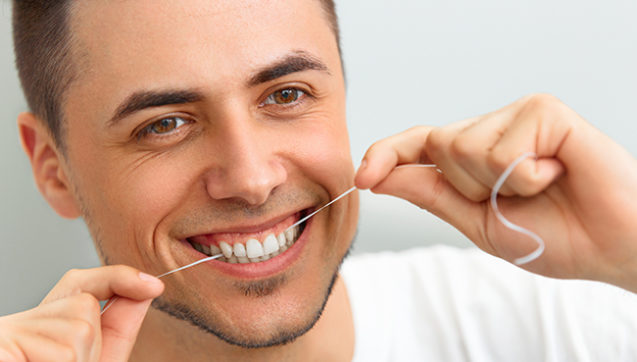Dental Consumer Products Overview: Denture Products
If you have dentures, or even if you haven’t, chances are you’ve seen TV advertisements for denture products. Because dentures and teeth loss can be emotional topics, it’s no surprise that the advertisements try (let’s call them) unconventional approaches. Sometimes they try too hard to be funny, sincere, or authoritative. Other times they go for realness and end up somewhere closer to too-much-information.
But for all their flaws, these ads are speaking to a sizable market. Over 60 million people in the US lack teeth, and according to the Journal of Prosthetic Dentistry, there will be 37.5 million people wearing full dentures by 2020. For people with dentures, consumer products on the market attempt to address two primary needs:
- Keeping dentures clean
- Keeping dentures in your mouth (preferably comfortably!)
Cleaning products come in a few varieties. Martha Raye, denture wearer, advocated for a brand of dissolving tablets that killed bacteria and remove stains. There are also pastes, much like toothpaste, that patients can use to brush their dentures—once the dentures are safely out of your mouth. Ultrasonic cleaning appliances can remove stains from dentures, although they are more expensive and also require the use of a special cleaning fluid. For patients concerned with chemical cleansers, homemade solutions using lemon juice, vinegar, or baking soda can all help remove stains and re-whiten dentures.
Denture adhesives include pastes or gels that come in a tube, like toothpaste and adhesive strips. These adhesives are meant to keep dentures in patients’ mouths comfortably while eating and talking.
Dentures are meant to fit comfortably in the mouth—and not require adhesives—because they are molded specially to the patient’s jawbone and palate. However, without teeth anchored in the jaw, the bone deteriorates over time, and its shape changes. This eventually leads to dentures that don’t fit, or that cause discomfort, requiring adhesive. Even cleaning dentures, which requires them to be removed from the mouth, could conceivably cause patients to experience negative feelings.
However, changes in dental technology can reduce these issues for patients. Fixed implant dentures use dental implants to secure replacement teeth permanently to the jaw. Patients can brush them in their mouth, just like teeth, and the implants themselves help the jawbone avoid further deterioration. Although implants do tend to be more expensive than traditional dentures, for many they are an appropriate, life-long solution to their dental needs.
Whether you’re looking for the best way to take care of your dentures or you’re considering whether implants might be a better solution for you, we’d love to talk to you. Call your Lancaster, CA dentist today at 661.952.7865 for an appointment to find out more!
More
Five Signs You Might Have Sleep Apnea… and One Thing You Can Do About It
At one point in time, maybe even only a few years ago, sleep apnea was not well-known among the public. Now, thankfully, public awareness of sleep apnea is much higher. After all, it is a dangerous condition, and because it is a disease that affects sleep, many people who have sleep apnea aren’t even aware of it.
If you suffer from sleep apnea, you will temporarily stop breathing during the night—up to hundreds of times! The health implications are quite serious, as sleep apnea is linked to many cardiovascular diseases, including high blood pressure, heart failure, stroke, and heart arrhythmias. So if you have sleep apnea, it’s important to get treatment.
So what are some signs or risk factors for sleep apnea?
- You’re overweight.
Body weight is linked to obstructive sleep apnea, which is caused by tissues in the upper throat collapsing, constricting the flow of air to the lungs. Heavier people can have tissue built up around their neck and throat; these tissues fall back and obstruct the airway when they’re lying down.
- You have high blood pressure.
When you stop breathing during an episode of sleep apnea, less oxygen gets to your brain. Since your brain needs to maintain sufficient oxygen levels at all times, this can lead to spikes in blood pressure as your body tries to compensate for low oxygen levels by pumping more blood, faster, to your brain.
- You’re often tired during the day.
Even if you think you’re getting plenty of sleep at night, you probably aren’t if you’re suffering from apnea. Not only do the interruptions detract from the amount of sleep you’re getting; they also detract from the quality of sleep. If you have difficulty waking up in the morning, feel tired all day long, need frequent naps, or doze off on occasion, you might have apnea.
- You’re frequently irritated, depressed, or prone to mood swings.
If you’re not getting enough sleep, it can quickly have an impact on your mood. Your body releases cortisol, a hormone that causes stress, if you’re sleep deprived. This means you might end up feeling anxious, irritable, or just out of sorts frequently.
- You snore.
If your spouse or significant other tells you that you snore, or if your snoring wakes you up, then that’s a good sign you might have sleep apnea. In fact, snoring is the most common sign of sleep apnea.
And now, for one thing you might not know about sleep apnea: there are treatment options other than a CPAP machine. In fact, if you have sleep apnea, you can call your dentist for help. There are simple oral appliances (mouth guards) that can position your jaw in such a way that it keeps your airway open during the night.
So if you’re concerned about sleep apnea, you might just want to talk to your Lancaster, CA dentist about it next time you’re in the office for a check-up. Call Douglas B. Weber, DDS at 661.952.7865 today, and we’ll be happy to help!
More
By admin
30 Aug, 2017
Dental Health, Dental Hygiene, Dental Tips, General Dentistry, Orthodontics
back to school, dental assistants, dental professionals, dental school, dentists, hygienists
As the calendar turns to August and the summer starts to wind down, parents (with fondness) and children (with dread) begin to think about notebooks, pencils, and new outfits… everything that goes along with Back to School season. But did you know that dentists, hygienists, and dental assistants spend a lot of time thinking about going back to school as well?
Forty-seven states require dentists to complete some amount of continuing education courses before they can renew their licenses. For hygienists, the total is higher still, with 48 states mandating continuing education. (Dental assistants get off a little easier; only 22 states have a minimum continuing education requirement.)
So what exactly are dentists and their teams studying… and why should it matter to you?
Read on to find out more!
In order to ensure that dentists, hygienists, and dental assistants are providing the best possible care to their patients, state licensing boards typically require these professionals to pass an exam to get their license. The certification lasts for one to five years, with two- and three-year terms being most common. Rather than require dental professionals to retake board examinations every couple years, most state licensing boards mandate dental professionals to take a certain amount of credit hours in continuing education to retain their license.
Many organizations provide continuing education courses, including the American Dental Association, dental graduate schools, and other professional dental associations and institutions. All of these organizations must be certified to provide professional-level training before the credits can count towards meeting licensing requirements.
Many states require dentists to include fundamental training in their continuing education—things like CPR and infection control. However, other topics are popular as well. Many institutes offer training in new dental techniques or technology; instruction in specialty dentistry like implants, orthodontics, or endodontics; or how to run their practice more effectively. Hygienists and dental assistants take continuing education classes that provide practical and technical instruction in their roles on a practice team. Courses can take place in person, online, or at special training events.
Why should this matter to you, as a patient?
It matters because when you go to a dentist, you can be sure that you’re getting top quality care from professionals that care enough to stay informed and trained in their field of expertise.
Dentists, like other medical professionals, are committed to the health and well-being of their patients, and continuing education requirements demonstrate that commitment. In fact, if you ask your dentist or hygienist, chances are that they’re not just meeting the requirements of their state dental board—they’re exceeding them!
If you’re curious about new technology in dentistry, new dental techniques, or what your dental care providers are studying, feel free to ask next time you’re in the office. We’ll be happy to tell you all about it.
Make an appointment with us today, and you can be sure you’ll be getting the highest quality dental care. Request an appointment today on our website or by calling the office at 661.952.7865!
More
Imagine you’re standing in the dental products aisle at your local Target or Walmart. You’re about to run out of floss at home, and you just want to pick some up. If you’re like most people, your first thought is probably something like this:
Why in the world are there so many types of dental floss?
Unfortunately, this can make it hard to know which product is the best. Being a dental practice, we have to tell you the truth: it doesn’t really matter a whole lot what type of floss you prefer, as long as you are actually flossing. However, that doesn’t really help you when you’re standing in the store, trying to decide between dozens of different types of dental floss.
In this series of blog posts, we’ll inform you about different types of dental products, so you can choose which dental product is right for you, starting with floss. With floss, it’s important to know that there a few different types of floss on the market. Choosing the one that’s right for you can make flossing pain-free and more effective.
Woven
There are two types of woven floss you may hear about. The first type of woven floss is generally made of cotton. With these flosses, you can clearly see the wrapped threads, especially since they are often different colors. Cotton woven floss can be very effective in cleaning plaque, and because of the material it’s made of, can also be gentler on your gums. The second type of woven floss consists of nylon filaments threaded together to form a single, larger thread.
In general, woven flosses are effective, but depending on the space between your teeth, the threads can come apart.
Monofilament
Monofilament floss is usually made of Teflon, and is a single thread. This means it is very durable and unable to fray like multifilament woven floss. Since Teflon has a slippery consistency, it is often much easier and more comfortable to fit between your teeth.
Waxed or unwaxed?
Wax helps the floss fit between your teeth more easily. Unwaxed floss squeaks, which is a benefit, because it tells you that it’s clean between your teeth. If you haven’t got a preference, try using both waxed and unwaxed floss to see which one works better and feels more comfortable for you.
Dental Tape
Dental tape is wider than the flosses described above. This is helpful if you have a wider gap in your teeth or dental fixtures like crowns, bridges, etc. If you have a hard time getting the dental tape in between your gums, consider changing to filament floss.
Floss Threaders
If you have braces, bridges, or permanent retainers, floss threaders are a must. Floss threaders have a rigid piece of string followed by a loop. You put your floss of choice in the loop, and guide the floss past your braces, bridges, or retainer. Then you can floss with the attached dental floss. This can take more time, but when braces or other fixtures are involved, flossing is even more vital in keeping your mouth healthy.
If you’ve read this far, you should know that there isn’t a “best” floss out there, only what works with each person’s needs and preferences. If you are unsure of what floss to use, ask your dental hygienist or dentist for advice on what may work best for you.
More
By admin
18 Mar, 2017
Dental Health, Dental Hygiene, Dental Tips, General Dentistry, General Health, Lifestyle, Oral Health
cavities, gingivitis, gum disease, plaque, tartar, teeth cleaning
Why do I Need Professional Teeth Cleanings?
Let’s look at five reasons why you should get your teeth regularly cleaned.
1. We check for oral cancer
With cancer, the sooner it’s detected the better chance you have of successfully getting rid of it. Oral cancer is no different. During each teeth cleaning, we check for any signs of oral cancer.
2. Cleanings help prevent cavities
Brushing and flossing every day will do wonders in maintaining a healthy mouth. But, sometimes you may forget to floss, or maybe you had a few too many sodas and candy bars. Our dental hygienists will ensure that your mouth is free of plaque, and can also give you tips for your at-home cleaning if they see something you may not be doing.
3. Cleanings help prevent gum disease
Gum disease can easily creep up on anyone. It is often painless until it becomes a bigger problem. When diagnosed with gingivitis, it can still be reversed with proper gum maintenance.
Once gingivitis progresses to periodontal disease, it requires ongoing professional care to prevent further damage to your mouth. Professional cleanings at twice a year drastically reduce the risk of gum disease ever starting.
4. Having a healthy mouth contributes to a healthy life
Poor oral health has been connected with diagnoses for diabetes, heart disease and pregnancy complications. Keeping your gums and teeth healthy will help prevent the occurrence of these diseases.
5. Regular cleanings are cheaper than taking care of oral problems
Receiving two professional cleanings a year may be an expense you don’t like to see. However, teeth cleanings are much cheaper than other procedures, such as root canals, scaling and root planing, and dental implants.
There is nothing better than a freshly cleaned mouth! Our dental hygienists will make sure you have pain free experience, and you can leave knowing you’ve taken a giant leap forward in maintaining a healthy smile.
If you have more questions about our professional teeth cleanings, or if you’d like to schedule an appointment, please call your Lancaster dentist at (661) 952-7865.
More





